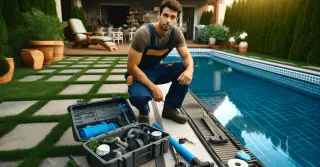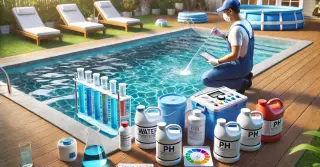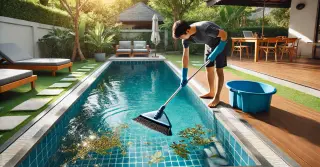Regular pool maintenance is essential for a clean, safe, and enjoyable pool. Failing to maintain your pool can result in algae growth, cloudy water, and equipment failures. By following a regular maintenance schedule, you can prevent these problems and ensure a healthy pool.
Essential Cleaning TasksEnsuring a clean pool requires consistent cleaning efforts. These tasks help eliminate debris, prevent algae, and maintain clear water.
- Debris Removal and Brushing: Regular skimming removes leaves, insects, and other floating debris from the pool's surface. This prevents debris from settling and causing water quality issues. Scrubbing the pool walls and floor eliminates dirt, algae, and buildup that can lead to stains and slippery areas. Routine skimming and brushing keep your pool looking its best and prevent algae growth.
- Pool Vacuuming: Cleaning the pool floor with a vacuum eliminates dirt and debris that has settled on the pool floor. Automatic pool vacuums simplify this task, but manual vacuuming is sometimes needed for a deep clean. Consistent vacuuming ensures clear water and prevents debris accumulation.
Maintaining Water ChemistryMaintaining balanced pool water is crucial for safety and comfort. Balanced chemicals inhibit algae, bacteria, and contaminants, and safeguard pool surfaces and equipment.
- Testing and Adjusting: Frequently testing the pool water for chlorine, pH, alkalinity, and calcium hardness is essential. Adjust chemicals as necessary to maintain proper balance. Utilizing a quality test kit helps you accurately measure these levels, so you can make necessary adjustments.
- Pool Shock Treatments: Shock treatments involve adding a high dose of chlorine to the pool to destroy bacteria, algae, and other harmful substances. This is important after heavy use or significant weather events. Regular shocking keeps the water sanitized and safe for swimming.
Filter MaintenanceThe filtration system in your pool plays a key role in keeping the water clean. Regular maintenance of the filter keeps it running efficiently.
- Cleaning Filters: Depending on your filter type—cartridge, sand, or diatomaceous earth (DE)—cleaning techniques vary. Cartridge filters should be removed and hosed down to clear dirt and debris. Sand and DE filters need backwashing to clean trapped particles. Frequent filter cleaning keeps the system running smoothly and ensures clear water.
- Changing Filter Media: Over time, the filter media will need to be replaced. Sand filters need new sand every 3-5 years. Cartridge filters should be replaced every 1-2 years. DE filter grids require replacement every 3-5 years. Frequently replacing filter media ensures peak filtration and water clarity.
Consistent pool upkeep is vital for maintaining a safe and pleasant swimming area. By following a structured maintenance schedule, you can maintain your pool's pristine condition for the long term.



